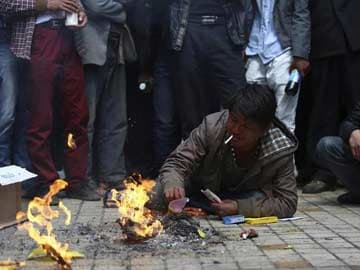
A man, whose relative was killed in a knife attack, lies on the floor as he burns offerings at the Kunming railway station in Yunnan province on March 3, 2014.
Beijing:
Beijing police have told prominent users of the microblogging site Weibo to cease comments deemed hurtful, including suggestions that authorities misled the public with accounts of a deadly train station attack blamed on militants from Xinjiang.
The warning was issued late on Thursday in response to postings offering different interpretations of the attack by knife-weilding assailants in the southwestern city of Kunming. At least 29 people were killed and police shot dead four of the attackers.
China says militants from the far western region of Xinjiang, home to a large Muslim Uighur minority, carried out the attack. Police said they were responding to complaints by netizens over bloggers' criticisms of media portrayal of events.
"One or two public intellectuals have shown scant regard for the facts, confused black and white. Their comments have hurt the people's feelings, and (other users) hope the police will deal with this," the statement said.
The users whose comments were singled out were well-known commentators with thousands or even millions of followers. Screen shots of the offending posts were attached.
Li Chengpeng, a writer and former journalist with over seven million Weibo followers, had posted a quote attributed to a Kunming journalist frustrated at the lack of information about the attacks.
"Never telling you what exactly happened, just letting you blindly hate and feel inexplicably afraid, that is living a confused life and dying understanding nothing," read the post, subsequently deleted.
He later wrote: "Persecuting people for their writing isn't done like this! I will be waiting at home for them to come and get me".
Another poster, Cheng Meixin, a former magazine editor with 10,000 followers, questioned the official version of events, saying: "There is no such thing as natural born killers. We have to admit that society isn't perfect and has its failings."
State media, quoting the ministry of public security on Friday, said police had also issued warnings or detained 45 people for spreading rumours about attacks in other regions.
One microblogger, cited by the official Xinhua news agency, had posted that "terrorists from Xinjiang" had attacked people in the eastern city of Hangzhou, killing 10 and injuring 80. Officials, Xinhua said, had dismissed the message as false.
The Communist Party last year stepped up an aggressive campaign to control online interaction, threatening legal action against people who issued "rumours" on microblogs if they were reposted more than 500 times or seen by more than 5,000 people.
Rights groups and dissidents criticised the crackdown as another tool for the party to limit criticism and to further control freedom of expression.
The warning was issued late on Thursday in response to postings offering different interpretations of the attack by knife-weilding assailants in the southwestern city of Kunming. At least 29 people were killed and police shot dead four of the attackers.
China says militants from the far western region of Xinjiang, home to a large Muslim Uighur minority, carried out the attack. Police said they were responding to complaints by netizens over bloggers' criticisms of media portrayal of events.
"One or two public intellectuals have shown scant regard for the facts, confused black and white. Their comments have hurt the people's feelings, and (other users) hope the police will deal with this," the statement said.
The users whose comments were singled out were well-known commentators with thousands or even millions of followers. Screen shots of the offending posts were attached.
Li Chengpeng, a writer and former journalist with over seven million Weibo followers, had posted a quote attributed to a Kunming journalist frustrated at the lack of information about the attacks.
"Never telling you what exactly happened, just letting you blindly hate and feel inexplicably afraid, that is living a confused life and dying understanding nothing," read the post, subsequently deleted.
He later wrote: "Persecuting people for their writing isn't done like this! I will be waiting at home for them to come and get me".
Another poster, Cheng Meixin, a former magazine editor with 10,000 followers, questioned the official version of events, saying: "There is no such thing as natural born killers. We have to admit that society isn't perfect and has its failings."
State media, quoting the ministry of public security on Friday, said police had also issued warnings or detained 45 people for spreading rumours about attacks in other regions.
One microblogger, cited by the official Xinhua news agency, had posted that "terrorists from Xinjiang" had attacked people in the eastern city of Hangzhou, killing 10 and injuring 80. Officials, Xinhua said, had dismissed the message as false.
The Communist Party last year stepped up an aggressive campaign to control online interaction, threatening legal action against people who issued "rumours" on microblogs if they were reposted more than 500 times or seen by more than 5,000 people.
Rights groups and dissidents criticised the crackdown as another tool for the party to limit criticism and to further control freedom of expression.
© Thomson Reuters 2014
Track Latest News Live on NDTV.com and get news updates from India and around the world

